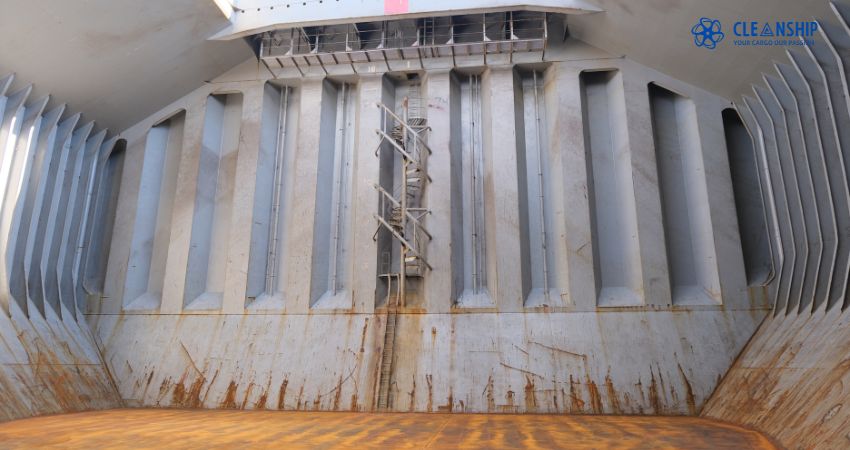Bulk carriers are important in global trade, transporting massive quantities of commodities such as grains, ores, and coal across oceans. These vessels are indispensable to the world economy, but their efficiency and safety heavily depend on proper maintenance, especially in the often overlooked aspect of cargo hold cleaning.
Here’s why prioritizing cargo hold cleaning is essential for bulk carriers:
1. Preventing Contamination and Cross-Contamination
Cargo holds in bulk carriers are designed to carry a wide range of dry bulk commodities. Residual cargo left behind after a shipment can contaminate subsequent cargoes, leading to quality issues and financial losses for both shipowners and cargo owners.
For example, traces of minerals or chemicals from one cargo can affect the quality and goodness of food grains or other sensitive commodities in the next load. Proper cleaning mitigates these risks by ensuring that holds are free from residues and contaminants.
2. Maintaining Cargo Goodness
Certain cargoes, such as grains and minerals, are particularly susceptible to contamination and degradation. Moisture, heat, and residues can accelerate spoilage, leading to significant financial losses.
Cargo hold cleaning helps maintain the integrity of these commodities by removing potential contaminants and creating a clean, dry environment suitable for the next cargo. This process is critical for preserving the quality and market value of transported goods.
3. Ensuring Compliance with Regulations
International regulations, such as the International Maritime Organization’s (IMO) guidelines on cargo residue disposal and the prevention of pollution during cargo operations, mandate that vessels must clean cargo holds thoroughly to prevent environmental contamination.
Compliance with these regulations is not only a legal requirement but also crucial for maintaining the reputation and operational licenses of shipping companies. Regular cleaning ensures adherence to environmental standards and reduces the risk of penalties or sanctions.
4. Enhancing Operational Efficiency
Clean cargo holds contribute to the overall efficiency of bulk carriers. A well-maintained vessel can load and unload cargo more quickly and efficiently, reducing port turnaround times.
This efficiency translates into cost savings for shipowners and charterers, as faster turnarounds increase the vessel’s earning potential and operational flexibility. Moreover, clean holds reduce the likelihood of delays caused by inspections or disputes over cargo quality.
5. Minimizing Safety Risks
Cargo hold cleaning is not only about maintaining cargo quality but also about ensuring the safety of onboard personnel. Residues and contaminants left in holds can pose health risks to crew members involved in loading, unloading, or cleaning operations.
Proper cleaning practices, including using appropriate personal protective equipment (PPE) and cleaning agents, mitigate these risks and create a safer working environment onboard bulk carriers.
6. Extending Vessel Lifespan
Regular maintenance, including thorough cargo hold cleaning, contributes to the longevity of bulk carriers. Residues left unchecked can lead to corrosion and structural damage over time, compromising the vessel’s structural integrity.
By preventing corrosion and maintaining cleanliness, shipowners can extend the operational lifespan of their vessels and reduce maintenance costs associated with premature wear and tear.
7. Upholding Industry Standards and Best Practices
In an industry where reputation and reliability are paramount, adhering to high standards of cleanliness and maintenance distinguishes reputable shipping companies from their competitors.
Investors, insurers, and customers alike value adherence to industry best practices, including rigorous cargo hold cleaning protocols. By prioritizing cleanliness, shipowners demonstrate their commitment to operational excellence and sustainability.
Conclusion
The importance of cargo hold cleaning in bulk carriers cannot be overstated. Beyond regulatory compliance and operational efficiency, it directly impacts cargo integrity, crew safety, and the overall lifespan of vessels.
As global trade continues to expand, the need for clean, efficient bulk carriers will only grow. Investing in thorough and regular cargo hold cleaning is not just a necessity but a strategic decision that enhances both operational reliability and sustainability in the maritime industry.
By prioritizing this aspect of maintenance, stakeholders ensure that bulk carriers remain indispensable contributors to global commerce well into the future.
FAQs:
1. What is cargo hold cleaning?
Cargo hold cleaning involves removing remains and impurities from ship holds and ensuring hygiene, safety, and regulatory compliance for new cargo.
2. What is in a cargo hold?
A cargo hold includes various goods or materials transported by a ship, protected from the parts, and securely stored for safety.
3. How will you do the cargo hold inspection?
Check cargo holds by checking for cleanliness, damage, and structural goodness, ensuring compliance with safety and regulatory standards.






Leave A Comment